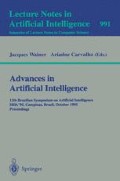Abstract
This paper proposes a computer aided discovery system which may also be seen as a knowledge acquisition environment. It uses a knowledge representation (the Semi-Empirical Theories) to formulate, to experiment, and to communicate that knowledge. The system's objective, rather than producing an exact knowledge, is yielding a knowledge which may present a high-level, convincing rationale on its validity and may also be improved via a dialog protocol. Emphasis is given to the proposed (abductive and inductive) mechanisms for efficiently generating knowledge. The paper proposes what seems to be good heuristics (based on measures of simplicity and of coverage) for better traversing both the hypotheses and the conjecture spaces, during the inductive step of the learning mechanisms.
Preview
Unable to display preview. Download preview PDF.
References
Addis, T. R.: Knowledge organization for abduction. Interdisciplinary Information Technology Conference. Bradford University, England (1988)
Aussenac-Gilles, N., Krivine, J.-P., Sallantin, J.: L'acquisition des connaissances pour les systêmes à base de connaissance. Revue d'Intelligence Artificielle (Editorial). 6(1–2) Paris (1992) 87–127
Barbut, C., Monjardet, B.: Ordre et Classification, Algèbre et Combinatoire. Hachette, Paris (1970)
Bratman, M., Konolige, K., Israel, D. J., Pollack, M. E.: Rational behavior in resource-bounded agents. SRI, NSF Project Proposal (1989)
Ferneda, E., Py, M., Reitz, Ph., Sallantin, J.: L'Agent Rationnel SAID: une application en géométrie. Proceedings of the First European Colloquium on Cognitive Science. Paris (1992)
Ferneda, E., Silva, C. A. P. da, Teixeira, L. de M., Silva, H. de M.: A system for aiding discovery in musical analysis. Proceedings of the First Brazilian Simposium on Computer Music. Caxambu (1994)
Lakatos, I.: Logic of Mathemathical Discovery: Proofs and Refutations. Cambridge University Press (1976)
Liquière, M.: INNE (INduction in NEtworks): A structural learning algorithm for noisy exemples. Proceedings of the Fourth European Working Session on Learning. Morik K. (Ed), Pitman and Morgan Kaufmann Publishers Inc. London (1990) 111–123 1
Mephu N'guifo, E., Sallantin, J.: Prediction of primary spline junction gene sequences with a cooperative knowledge acquisition system. Proceedings of the First International Conference on Intelligent Systems for Molecular Biology. Washington (1993)
Mephu N'guifo, E.: Galois Lattice: a fremework for concept learning. Design, evaluation and Refinement. Proceedings of the T.A.I.'94 Conference — Tools for Artificial Intelligence. Louisiana (1994)
Newell A.: The knowledge level. Artificial Intelligence. 18 (1982) 87–127
Nilsson N.: Intelligent communicating agents. Stanford University, Project Proposal (1986)
Py M.: Analogical reasoning: an organic chemistry application. 8th International Conference on Applications of Artificial Intelligence in Engineering. Toulouse (1993)
Reitz Ph.: Contribution à l'étude des environnements d'aprentissage. Conceptualisation, Spécification et Prototypage. Doctorate Thesis. Université de Montpellier (1992)
Sallantin, J.: Logiques et comportements des systèmes rationnels — une esquisse d'épistémologie. In: Moigne J.-L. (Org). Intelligence des mécanismes, mécanismes de l'intelligence”, Fayard / Fondation Diderot, Paris (1986)
Sallantin, J., Szczeciniarz J.-J., Barboux C., Lagrange M.-S., Renaud M.: Théories semi-empiriques: conceptualisation et illustrations. Revue d'Intelligence Artificielle (Editorial). 5(1) Paris, France (1991) 9–67
Sallantin, J., Quinqueton J., Barboux C., Aubert J.-P.: Théories semi-empiriques: éléments de formalisation. Revue d'Intelligence Artificielle (Editorial). 5(1) Paris (1991) 69–92
Wielinga, B., Boose, J., Gaines, B., Screiber, G., Someren, M. van (Eds): Current trends on knowledge acquisition. Proceedings of the European Knowledge Acquisition Workshop (1990)
Wille, R.: Concept lattices and conceptual knowledge systems. Computers Mathematic Applications 23(6–9) (1992) 493–515
Author information
Authors and Affiliations
Editor information
Rights and permissions
Copyright information
© 1995 Springer-Verlag Berlin Heidelberg
About this paper
Cite this paper
Ferneda, E., de Souza e Silva, M.E., de Menezes Silva, H. (1995). A system for aiding discovery: Mechanisms for knowledge generation. In: Wainer, J., Carvalho, A. (eds) Advances in Artificial Intelligence. SBIA 1995. Lecture Notes in Computer Science, vol 991. Springer, Berlin, Heidelberg. https://doi.org/10.1007/BFb0034819
Download citation
DOI: https://doi.org/10.1007/BFb0034819
Published:
Publisher Name: Springer, Berlin, Heidelberg
Print ISBN: 978-3-540-60436-5
Online ISBN: 978-3-540-47467-8
eBook Packages: Springer Book Archive

